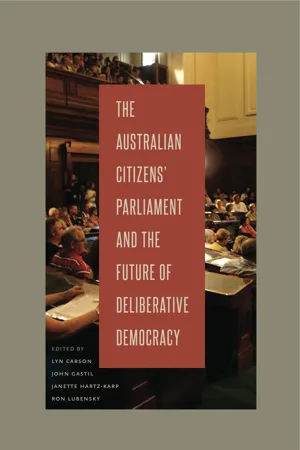
The Australian Citizens’ Parliament and the Future of Deliberative Democracy
- English
- PDF
- Available on iOS & Android
The Australian Citizens’ Parliament and the Future of Deliberative Democracy
About this book
Growing numbers of scholars, practitioners, politicians, and citizens recognize the value of deliberative civic engagement processes that enable citizens and governments to come together in public spaces and engage in constructive dialogue, informed discussion, and decisive deliberation. This book seeks to fill a gap in empirical studies in deliberative democracy by studying the assembly of the Australian Citizens' Parliament (ACP), which took place in Canberra on February 6–8, 2009. The ACP addressed the question "How can the Australian political system be strengthened to serve us better?"
The ACP's Canberra assembly is the first large-scale, face-to-face deliberative project to be completely audio-recorded and transcribed, enabling an unprecedented level of qualitative and quantitative assessment of participants' actual spoken discourse. Each chapter reports on different research questions for different purposes to benefit different audiences. Combined, they exhibit how diverse modes of research focused on a single event can enhance both theoretical and practical knowledge about deliberative democracy.
Tools to learn more effectively

Saving Books

Keyword Search

Annotating Text

Listen to it instead
Information
Table of contents
- COVER Front
- Series Page
- Copyright Page
- Table of Contents
- List of Illustrations
- List of Tables
- Acknowledgments
- Introduction (Lyn Carson, John Gastil, Janette Hartz-Karp, and Ron Lubensky)
- Notes to Introduction
- PART I: Deliberative Design and Innovation
- Chapter 1: Origins of the First Citizens’ Parliament (Lyn Carson and Luca Belgiorno-Nettis)
- Chapter 2: Putting Citizens in Charge: Comparing the Australian Citizens’ Parliament and the Australia 2020 Summit (Janette Hartz-Karp and Lyn Carson)
- Notes to Chapter 2
- Chapter 3: Choose Me: The Challenges of National Random Selection (Ron Lubensky and Lyn Carson)
- Notes to Chapter 3
- Chapter 4: Grafting an Online Parliament onto a Face-to-Face Process (Brian Sullivan and Janette Hartz-Karp)
- Notes to Chapter 4
- PART II: Exploring Deliberation
- Chapter 5: Listening Carefully to the Citizens’ Parliament: A Narrative Account (Ron Lubensky)
- Notes to Chapter 5
- Chapter 6: Deliberative Design and Storytelling in the Australian Citizens’ Parliament (Laura W. Black and Ron Lubensky)
- Notes to Chapter 6
- Chapter 7: What Counts as Deliberation? Comparing Participant and Observer Ratings (John Gastil)
- Notes to Chapter 7
- Chapter 8: Hearing All Sides? Soliciting and Managing Different Viewpoints in Deliberation (Anna Wiederhold and John Gastil)
- Notes to Chapter 8
- Chapter 9: Sit Down and Speak Up: Stability and Change in Group Participation (Joseph A. Bonito, Renee A. Meyers, John Gastil, and Jennifer Ervin)
- Notes to Chapter 9
- PART III: The Flow of Beliefs and Ideas
- Chapter 10: Changing Orientations Toward Australian Democracy (Simon Niemeyer, Luisa Batalha, and John S. Dryzek)
- Notes to Chapter 10
- Chapter 11: Staying Focused: Tracing the fFow of Ideas from the Online Parliament to Canberra (John Gastil and John Wilkerson)
- Notes to Chapter 11
- Chapter 12: Evidence of Peer Influence in the Citizens’ Parliament (Luc Tucker and John Gastil)
- Notes to Chapter 12
- PART IV: Facilitation and Organizer Effects
- Chapter 13: The Unsung Heroes of a Deliberative Process: Reflections on the Role of Facilitators at the Citizens’ Parliament (Max Hardy and Kath Fisher, with Janette Hartz-Karp)
- Notes to Chapter 13
- Chapter 14: Are They Doing What They Are Supposed to Do?: Assessing the Facilitating Process of the Australian Citizens’ Parliament (Li Li, Fletcher Ziwoya, Laura W. Black, and Janette Hartz-Karp)
- Notes to Chapter 14
- Chapter 15: Supporting the Citizen Parliamentarians: Mobilizing Perspectives and Informing DiscussionI (an Marsh and Lyn Carson)
- Notes to Chapter 15
- Chapter 16: Investigation of (and Introspection on) Organizer Bias (Lyn Carson)
- Notes to Chapter 16
- PART V: Impacts and Reflections
- Chapter 17: Participant Accounts of Political Transformation (Katherine R. Knobloch and John Gastil)
- Notes to Chapter 17
- Chapter 18: Becoming Australian: Forging a National Identity Through Deliberation (Janette Hartz-Karp, Patrick Anderson, John Gastil, and Andrea Felicetti)
- Notes to Chapter 18
- Chapter 19: Mediated Meta-Deliberation: Making Sense of the Australian Citizens’ Parliament (Eike Mark Rinke, Katherine R. Knobloch, John Gastil, and Lyn Carson)
- Notes to Chapter 19
- Chapter 20: How NOT to Introduce Deliberative Democracy: The 2010 Sitizens’ Assembly on Climate Change Proposal (Lyn Carson)
- Notes to Chapter 20
- Conclusion: Theoretical and Practical Implications of the Citizens’ Parliament Experience (Janette Hartz-Karp, Lyn Carson, John Gastil, and Ron Lubensky)
- Notes to Conclusion
- List of Contributors
- Index
- Series Page
- COVER Back
Frequently asked questions
- Essential is ideal for learners and professionals who enjoy exploring a wide range of subjects. Access the Essential Library with 800,000+ trusted titles and best-sellers across business, personal growth, and the humanities. Includes unlimited reading time and Standard Read Aloud voice.
- Complete: Perfect for advanced learners and researchers needing full, unrestricted access. Unlock 1.4M+ books across hundreds of subjects, including academic and specialized titles. The Complete Plan also includes advanced features like Premium Read Aloud and Research Assistant.
Please note we cannot support devices running on iOS 13 and Android 7 or earlier. Learn more about using the app